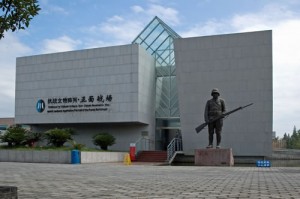A museum of corruption is planned in the southwest province of Sichuan, China Daily reported, citing from a local paper. The museum is seeking nominations from netizens of the 100 most corrupt officials in the last century.
The project is first suggested on the microblog of Fan Jianchuan, founder of the Jianchuan Museum in Chengdu. He said that the museum will accept nominations from the public who can vote on his museum’s website. Criteria for deciding on the top 100 will include the corrupt official’s seniority, amounts involved, by what means, circumstances and impacts on the society.

The Jianchuan Museum is a cluster of 15 museums located in Chengdu, Sichuan Province
Fan said he will ask for supports from the Communist Party’s disciplinary committee to turn the initiative into a anti-corruption educational center. He said that exhibitions of corruption organized by party disciplinary committee are very common nationwide, but a museum is yet to be created. He thinks the museum will create a positive effect on the society. He has started to single out ‘corruption artifacts’ from his existing collections, including court verdicts and documents of confession.
The suggestion receives overwhelming responses on the internet. Qian Guilin (钱桂林) thinks that it is a very innovative idea with positive educational impacts:
雨果说过:“多办一所学校,就可以少建一座监狱。”教育的力量是伟大的,没有什么比教育能够对人的思想产生更大的影响了。建贪官博物馆,比单纯让干部听一两次反腐报告或参观一两个图片展览更具震撼力和震慑力,能教育和警醒广大干部,让他们树立正确的人生观、权力观、地位观和价值观
Victor Hugo said: ‘He who opens a school door, closes a prison.’ Education can have enormous impacts. The power and shock created by a museum is far greater than that of one or two anti-corruption lectures or exhibitions. This can help erect correct values on life and power among Chinese officials.
Meanwhile, Sun Jindong (孙金栋) identifies several flaws in the proposal:
从内容看,百强以何标准衡量?如果以官员级别最高者入选,以贪污金额最多者入选,以手段最阴险者入选,以年龄最大、最小者入选,它是一个动态的过程,不可能象抗日战争、解放战争那样,成为已经过去、不再变化的一个静止点。因此,这个“百强”之最只能是相对而言,新的百强随时在产生,百强纪录将被不断刷新,“百强贪官”最终成为名不符实。
Content wise, how do you decide the top 100? You cannot judge it by the official’s position, amounts involved, method of corruption or even age, since these factors are dynamic. This is unlike historical events like the anti-Japanese or liberation wars, which are static. Therefore, the concept of top 100 is relative; new record-breaking top 100 will appear in future, rendering the description ‘top 100’ meaningless.
从冠名看更不确切,“百强贪官”强在何处?从本质上说,他们都是纸老虎。得势、得志、在位时,一个个貌似强大,呼风唤雨,猖狂之极。一旦败露,就成了不齿于人类的狗屎堆,成了人民的阶下囚,或者受到极刑严惩成为历史的罪人,他们强在何处?
Naming wise, why are the ‘top 100’ described as ‘top’ in the first place? They are in essence paper tigers. They abuse their power while in their position as officials. Once arrested, they become prisoners and black spots in history. Why are they described as ‘top’?
Turning to the phenomenon of corruption, Wu Min (吴敏) thinks that the Chinese public is helpless in face of corrupt officials. Building a corruption museum as a kind of ‘black humor’ is all they can do.
“贪污、潜规则已经成为现在中国社会的一种文化。既然是文化,应该加以保护并好好研究。不但要建博物馆,同时,还应向联合国申请国际文化遗产。”有网友不无风趣地说到。笔者认为,导致建设“贪官馆”的根源是社会道德出现了短路。道德短路,致使良善缺失、黑白不分、公平失衡等,这种大社会背景,成为滋生腐败的温床。加之社会制度的不完善,催生着种种贪腐劣迹,充斥在民众的眼前。
One netizen commented that ‘corruption and hidden rules are already part of the Chinese culture. As it is culture, it should be well protected and researched. Building a museum is not enough; we should include it in the United Nation’s List of Intangible Cultural Heritage.’ I believe that there is some sort of ‘moral short-circuiting’ – there is a lack of justice, fairness and honesty in our society. It is under this circumstance, together with flaws in our social institutions, that leads to widespread corruption.
Chinese Premier Wen Jiabao said in March that China is still ‘prone to corruption’ and plagued with ‘unfair law enforcement and inefficient governance’ despite years of anti-corruption efforts. China has issued a code of ethics for officials earlier this year specifying 52 unacceptable practices.







1 comment
this is a good idea